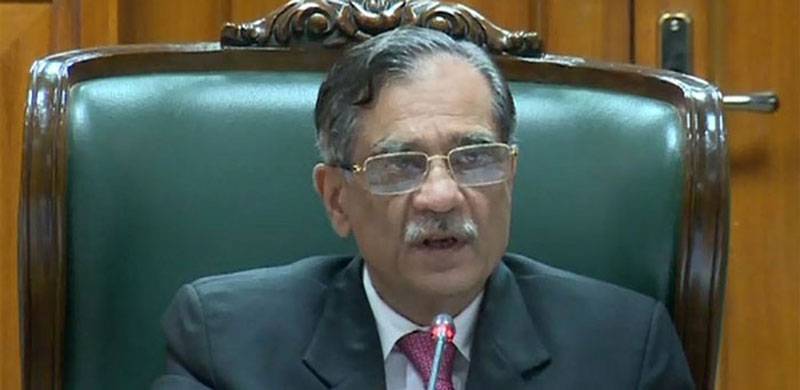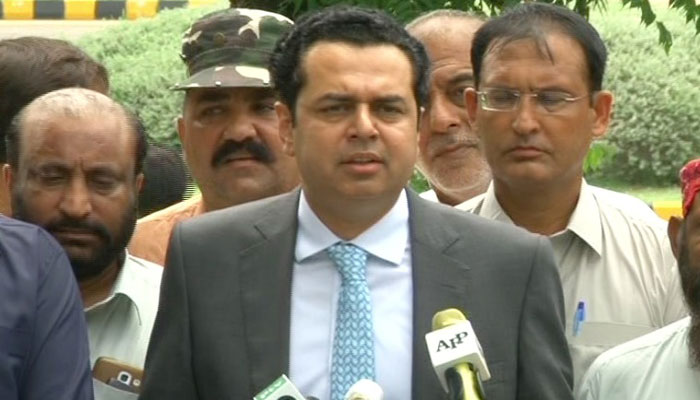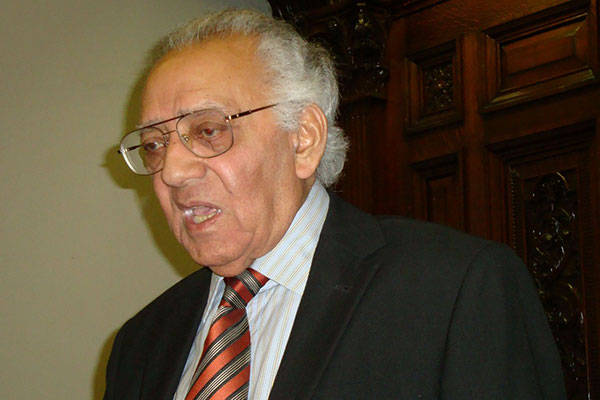
This week the Supreme Court of Pakistan continued to hear the Al-Azizia and HME Steel Mills reference case against former Prime Minister Nawaz Sharif, where defence council Khawaja Haris Ahmed made his final arguments.
Earlier this month, Nawaz Sharif appeared before the Supreme Court over allegations of illegally transferring 14,398 acres of Pakpattan’s Auqaf land during his tenure as Punjab chief minister.
Disqualified for life
After being disqualified as the prime minister as part of the Panama Papers investigations, the former premier has had a tumultuous time with the judiciary this year as well.
In April, the Supreme Court ruled that disqualification under Constitution’s Article 62 (1)(f) would be applicable for life.
While this meant that former Pakistan Tehrik-e-Insaf (PTI) General Secretary Jehangir Tareen would meet the same fate, for Nawaz it reaffirmed his narrative that the judiciary is collaborating with the military establishment to undermine him and his party.

The National Accountability Bureau (NAB) arresting Shehbaz Sharif and Saad Rafique in housing scams is considered an extension of the same.
But while political cases dominated the Supreme Court, a landmark judgement came from the apex court on an unlikely front.
Landmark judgement
The overturn of the death sentence of a blasphemy accused has been touted as one of the landmark rulings in Pakistan’s judicial history. Asia Bibi, a Christian woman, had been on death row since 2010. The Lahore High Court in its October 2014 ruling upheld the decision of the trial court. All hopes seemed loss for the mother of five and her family until the Supreme Court took up her appeal for hearing.
“Keeping in mind the evidence produced by the prosecution against the alleged blasphemy committed by the appellant, the prosecution has categorically failed to prove its case beyond reasonable doubt,” Chief Justice Saqib Nisar said in the SC ruling.
The judgment also quoted verses from Islamic scriptures to acquit Bibi of the charge, ordering her immediate release. The top judge later defended the ruling and said the court could not punish someone who was proven innocent.
On the water front
Asia Bibi’s wasn’t the only high profile case taken up by the court as Justice Nisar, who had become the chief justice in 2016, took suo motu notices of matters ranging from construction of dams to tax deduction on mobile cards. Recently, the top judge returned from a fund-raising event held by overseas Pakistanis for the construction of Diamer-Bhasha and Mohmand dams in the UK.

The case dates back to July when a four-judge bench of the Supreme Court, headed by Justice Nisar, observed that water was crucial to survival of the country and ordered the authorities concerned, including the government and the Water and Power Development Authority (Wapda), to build dams on immediate basis.
He also urged Pakistanis to generously contribute to the construction of the two dams. A fund dedicated solely for the purpose was set up. It was later merged with the prime minister’s fund and renamed ‘The Supreme Court of Pakistan and the Prime Minister of Pakistan Diamer-Bhasha and Mohmand Dams Fund’. Till date, the fund has managed to collect over eight billion Pakistani rupees.
Bottling it
International experts have warned of a looming crisis of water, which could reduce by half if adequate measures are not taken to address it. After the findings of a report on impending water crisis were made public earlier this year, the top court made sure that water remained a priority issue, with the chief justice frequently stressing the need for water conservation.
https://www.youtube.com/watch?v=qOBQyV85MPw
On November 19, a two-member SC bench ordered a judicial commission to monitor companies selling bottled water. The bench, while ordering the closure of Naubahar Bottling Company, asked beverage giants, including Pepsi Cola and Nestle, to rectify their errors within 10 days, and observed that there was no certified matter to assess the quality of water.
The same day, a cement factory was also told to pay a 100 million rupee fine in the Katas Raj case after the top judge was informed that cement factories near the temple had sucked up large quantities of groundwater through a number of drill bores, rendering Katas Raj almost out of water.
DG Khan Cement Company Limited was told to deposit PKR100 million into the dam fund – PKR20 million as payment for water utilised by the factory and PKR20 million in penalties for attempting to mislead the apex court.
Mafia’s Bomb
The top court did not limit its attention to the water cause as it ordered stern action against encroachments and land mafias. The government was told to regularise all properties in Banigala, which hosts the residence of Prime Minister Imran Khan. Justice Saqib Nisar said the premier himself had to initiate the regularisation process by paying the required fee.
The authorities in the wake of the orders initiated a grand operation against illegal establishments and land mafias. At present, operations are being carried out across the country. The officials claim they have recovered hundreds of thousands of acres of state land worth billions of rupees from illegal occupants. Illegal structures and encroachments are being razed in major cities, including Lahore and Karachi.

At the height of the operation, a man appeared before the chief justice to hand himself over to the authorities. Mansha Bomb said he had decided to surrender as he was involved in land grabbing. Moreover, the top court ordered the Lahore administration to return the land recovered from the notorious land grabber to its original owner within seven days. He also reprimanded the police for their purported role in assisting Bomb.
Earlier this year, the Supreme Court ordered real estate giant Bahria Town to return 9,385 acres of land handed over to the builder by the Sindh government. The top court declared illegal, void ab initio and as such of no legal existence any activity done under the provisions of the Colonisation of Government Land Act 1912 by the provincial government.
Array of disarray
Besides ordering cellular companies not to deduct taxes on mobile cards, Justice Saqib Nisar also came to the aid of the journalist community, currently in a financial disarray, when he ordered media outlets to clear their dues of their employees.

The top court also found itself at loggerheads with several politicians and government officials; most recently telling Sindh Chief Minister Murad Ali Shah to pay a fine of PKR1.4 million for a government advertisement featuring the chief minister’s picture. Murad had been told to either pay the fine out of his pocket or have the Pakistan People’s Party (PPP) pay it for him.
Days after he became the Punjab chief minister, Usman Buzdar was bludgeoned into apologising for ordering the transfer of a Pakpattan police officer over an alleged altercation with Khawar Maneka, former husband of the first lady Bushra Maneka.
Under the cosh
Several members of the PML-N who were highly critical of the judiciary were also indicted by the Supreme Court for contempt of court. In February, firebrand PML-N leader Nehal Hashmi was indicted for issuing threats to the judiciary in a video that had went viral. He was sentenced to one-month imprisonment and barred from holding public office for five years.
On March 14, the top court had indicted Tallal Chaudhry for his alleged derogatory and contemptuous statements and speeches against the superior judiciary at PML-N public gatherings.

Hailed by some as a savior and seen by others as the epitome of judicial activism, Justice Nisar has emerged as somewhat of a controversial figure in Pakistan. Not known to shy away from frequent public speeches and interactions, the top judge is often vocal in his criticism of what some say he see as his ‘critics’.
The most prominent criticism against the CJP has been his foray into populism and taking up selective accountability, which has resulted in the judiciary being accused of becoming a party in the country’s power plays.
‘CJP has done the nation a favour’
Former Supreme Court Bar Association Secretary Aftab Bajwa feels allegations of populism citing the dam fund are completely unfounded.
“There are four elements that create life, and water is one of them – that nobody seems to care about. None of the previous governments paid much attention to [the construction of dams]. All previous governments gave a free hand to India such that our rivers Ravi, Sutlej and Jhelum are now dry. The CJP has done the nation a favour by taking up the cause,” he said.
Bajwa feels it is natural that the guilty are crying foul. “Whenever something pains someone they call it controversial. The anti-corruption drive is to safeguard the future of this country. The money that we’re talking about is now in billions, until you end corruption in this country, the average citizen can’t get any rights.
“PML-N and PPP have been friendly oppositions for one and another and looted the entire country. Someone has to hold them accountable. Even when you hold a kid accountable he is upset. It’s their responsibility to explain their position to the nation.”
‘Evidence of CJP’s partiality’
Veteran Supreme Court lawyer Abid Hassan Minto acknowledges the significance of the verdict in the Asia Bibi case.
“It was the right decision on evidence – because there was no evidence to uphold the conviction. It was a judicial decision and whenever criminal law is applied the court would need evidence to implicate the accused,” he said.

However, he remains critical of the role that the CJP has assignment himself. “There is no governance model in the country and hence anyone who exercises some authority starts to think he can fix the problems. Saqib Nisar is one of them.”
“When someone moves out of their jurisdiction, it is bound to get controversial and create issues in the society. If you’re trying to speak solely by virtue of authority that creates problem. Making dams is the government’s job. The democratically elected government should discuss this in the parliament.”
Minto says the CJP has showed partisanship while dealing with political cases. “There are evidences for the CJP’s partiality. I don’t know if he’s deliberately done so or if he thought it was a legal necessity. In our society, people in authority – in particular judicial authority – take steps that, strictly speaking, do not come under judicial exercise of power. Many operate in accordance with their own views about the society and people”.
‘If CJP is supporting a party it’s on merit’
Former Lahore High Court Justice Abdul Qayyum, whose wife has donated to the dam fund as well, feels the CJP was forced into focusing on the water crisis.
“It is not the Chief Justice’s responsibility to collect funds, but he has been forced into doing it, because no one would’ve been able to do it. Even though the law of necessity has been buried but it comes up in such cases,” he said.
Qayyum concedes that the judiciary has become more political. “I feel that [the Chief Justice] has been doing even-headed justice, and giving the right verdicts. If he’s supporting a party it must be on merit,” he said.
“Judiciary isn’t aloof from politics. It is definitely involved in politics now. This is owing to suo motu actions on political subjects.
“This is something that needs to be checked going into 2019, because there are things in this country such that the institutions responsible for particular jobs aren’t doing it. And others take action without considering the interests of the country.”
Earlier this month, Nawaz Sharif appeared before the Supreme Court over allegations of illegally transferring 14,398 acres of Pakpattan’s Auqaf land during his tenure as Punjab chief minister.
Disqualified for life
After being disqualified as the prime minister as part of the Panama Papers investigations, the former premier has had a tumultuous time with the judiciary this year as well.
In April, the Supreme Court ruled that disqualification under Constitution’s Article 62 (1)(f) would be applicable for life.
While this meant that former Pakistan Tehrik-e-Insaf (PTI) General Secretary Jehangir Tareen would meet the same fate, for Nawaz it reaffirmed his narrative that the judiciary is collaborating with the military establishment to undermine him and his party.

The National Accountability Bureau (NAB) arresting Shehbaz Sharif and Saad Rafique in housing scams is considered an extension of the same.
But while political cases dominated the Supreme Court, a landmark judgement came from the apex court on an unlikely front.
Landmark judgement
The overturn of the death sentence of a blasphemy accused has been touted as one of the landmark rulings in Pakistan’s judicial history. Asia Bibi, a Christian woman, had been on death row since 2010. The Lahore High Court in its October 2014 ruling upheld the decision of the trial court. All hopes seemed loss for the mother of five and her family until the Supreme Court took up her appeal for hearing.
Also read: Imagining the agony that Asia Bibi must have been through
“Keeping in mind the evidence produced by the prosecution against the alleged blasphemy committed by the appellant, the prosecution has categorically failed to prove its case beyond reasonable doubt,” Chief Justice Saqib Nisar said in the SC ruling.
The judgment also quoted verses from Islamic scriptures to acquit Bibi of the charge, ordering her immediate release. The top judge later defended the ruling and said the court could not punish someone who was proven innocent.
On the water front
Asia Bibi’s wasn’t the only high profile case taken up by the court as Justice Nisar, who had become the chief justice in 2016, took suo motu notices of matters ranging from construction of dams to tax deduction on mobile cards. Recently, the top judge returned from a fund-raising event held by overseas Pakistanis for the construction of Diamer-Bhasha and Mohmand dams in the UK.

The case dates back to July when a four-judge bench of the Supreme Court, headed by Justice Nisar, observed that water was crucial to survival of the country and ordered the authorities concerned, including the government and the Water and Power Development Authority (Wapda), to build dams on immediate basis.
He also urged Pakistanis to generously contribute to the construction of the two dams. A fund dedicated solely for the purpose was set up. It was later merged with the prime minister’s fund and renamed ‘The Supreme Court of Pakistan and the Prime Minister of Pakistan Diamer-Bhasha and Mohmand Dams Fund’. Till date, the fund has managed to collect over eight billion Pakistani rupees.
Bottling it
International experts have warned of a looming crisis of water, which could reduce by half if adequate measures are not taken to address it. After the findings of a report on impending water crisis were made public earlier this year, the top court made sure that water remained a priority issue, with the chief justice frequently stressing the need for water conservation.
https://www.youtube.com/watch?v=qOBQyV85MPw
On November 19, a two-member SC bench ordered a judicial commission to monitor companies selling bottled water. The bench, while ordering the closure of Naubahar Bottling Company, asked beverage giants, including Pepsi Cola and Nestle, to rectify their errors within 10 days, and observed that there was no certified matter to assess the quality of water.
The same day, a cement factory was also told to pay a 100 million rupee fine in the Katas Raj case after the top judge was informed that cement factories near the temple had sucked up large quantities of groundwater through a number of drill bores, rendering Katas Raj almost out of water.
DG Khan Cement Company Limited was told to deposit PKR100 million into the dam fund – PKR20 million as payment for water utilised by the factory and PKR20 million in penalties for attempting to mislead the apex court.
Mafia’s Bomb
The top court did not limit its attention to the water cause as it ordered stern action against encroachments and land mafias. The government was told to regularise all properties in Banigala, which hosts the residence of Prime Minister Imran Khan. Justice Saqib Nisar said the premier himself had to initiate the regularisation process by paying the required fee.
The authorities in the wake of the orders initiated a grand operation against illegal establishments and land mafias. At present, operations are being carried out across the country. The officials claim they have recovered hundreds of thousands of acres of state land worth billions of rupees from illegal occupants. Illegal structures and encroachments are being razed in major cities, including Lahore and Karachi.

At the height of the operation, a man appeared before the chief justice to hand himself over to the authorities. Mansha Bomb said he had decided to surrender as he was involved in land grabbing. Moreover, the top court ordered the Lahore administration to return the land recovered from the notorious land grabber to its original owner within seven days. He also reprimanded the police for their purported role in assisting Bomb.
Earlier this year, the Supreme Court ordered real estate giant Bahria Town to return 9,385 acres of land handed over to the builder by the Sindh government. The top court declared illegal, void ab initio and as such of no legal existence any activity done under the provisions of the Colonisation of Government Land Act 1912 by the provincial government.
Array of disarray
Besides ordering cellular companies not to deduct taxes on mobile cards, Justice Saqib Nisar also came to the aid of the journalist community, currently in a financial disarray, when he ordered media outlets to clear their dues of their employees.

The top court also found itself at loggerheads with several politicians and government officials; most recently telling Sindh Chief Minister Murad Ali Shah to pay a fine of PKR1.4 million for a government advertisement featuring the chief minister’s picture. Murad had been told to either pay the fine out of his pocket or have the Pakistan People’s Party (PPP) pay it for him.
Days after he became the Punjab chief minister, Usman Buzdar was bludgeoned into apologising for ordering the transfer of a Pakpattan police officer over an alleged altercation with Khawar Maneka, former husband of the first lady Bushra Maneka.
Under the cosh
Several members of the PML-N who were highly critical of the judiciary were also indicted by the Supreme Court for contempt of court. In February, firebrand PML-N leader Nehal Hashmi was indicted for issuing threats to the judiciary in a video that had went viral. He was sentenced to one-month imprisonment and barred from holding public office for five years.
On March 14, the top court had indicted Tallal Chaudhry for his alleged derogatory and contemptuous statements and speeches against the superior judiciary at PML-N public gatherings.

Hailed by some as a savior and seen by others as the epitome of judicial activism, Justice Nisar has emerged as somewhat of a controversial figure in Pakistan. Not known to shy away from frequent public speeches and interactions, the top judge is often vocal in his criticism of what some say he see as his ‘critics’.
The most prominent criticism against the CJP has been his foray into populism and taking up selective accountability, which has resulted in the judiciary being accused of becoming a party in the country’s power plays.
‘CJP has done the nation a favour’
Former Supreme Court Bar Association Secretary Aftab Bajwa feels allegations of populism citing the dam fund are completely unfounded.
“There are four elements that create life, and water is one of them – that nobody seems to care about. None of the previous governments paid much attention to [the construction of dams]. All previous governments gave a free hand to India such that our rivers Ravi, Sutlej and Jhelum are now dry. The CJP has done the nation a favour by taking up the cause,” he said.
Also read: Justice Delayed is Justice Denied
Bajwa feels it is natural that the guilty are crying foul. “Whenever something pains someone they call it controversial. The anti-corruption drive is to safeguard the future of this country. The money that we’re talking about is now in billions, until you end corruption in this country, the average citizen can’t get any rights.
“PML-N and PPP have been friendly oppositions for one and another and looted the entire country. Someone has to hold them accountable. Even when you hold a kid accountable he is upset. It’s their responsibility to explain their position to the nation.”
‘Evidence of CJP’s partiality’
Veteran Supreme Court lawyer Abid Hassan Minto acknowledges the significance of the verdict in the Asia Bibi case.
“It was the right decision on evidence – because there was no evidence to uphold the conviction. It was a judicial decision and whenever criminal law is applied the court would need evidence to implicate the accused,” he said.

However, he remains critical of the role that the CJP has assignment himself. “There is no governance model in the country and hence anyone who exercises some authority starts to think he can fix the problems. Saqib Nisar is one of them.”
“When someone moves out of their jurisdiction, it is bound to get controversial and create issues in the society. If you’re trying to speak solely by virtue of authority that creates problem. Making dams is the government’s job. The democratically elected government should discuss this in the parliament.”
Minto says the CJP has showed partisanship while dealing with political cases. “There are evidences for the CJP’s partiality. I don’t know if he’s deliberately done so or if he thought it was a legal necessity. In our society, people in authority – in particular judicial authority – take steps that, strictly speaking, do not come under judicial exercise of power. Many operate in accordance with their own views about the society and people”.
‘If CJP is supporting a party it’s on merit’
Former Lahore High Court Justice Abdul Qayyum, whose wife has donated to the dam fund as well, feels the CJP was forced into focusing on the water crisis.
“It is not the Chief Justice’s responsibility to collect funds, but he has been forced into doing it, because no one would’ve been able to do it. Even though the law of necessity has been buried but it comes up in such cases,” he said.
Also read: Imagine a democracy where the Leader of Opposition is imprisoned
Qayyum concedes that the judiciary has become more political. “I feel that [the Chief Justice] has been doing even-headed justice, and giving the right verdicts. If he’s supporting a party it must be on merit,” he said.
“Judiciary isn’t aloof from politics. It is definitely involved in politics now. This is owing to suo motu actions on political subjects.
“This is something that needs to be checked going into 2019, because there are things in this country such that the institutions responsible for particular jobs aren’t doing it. And others take action without considering the interests of the country.”
